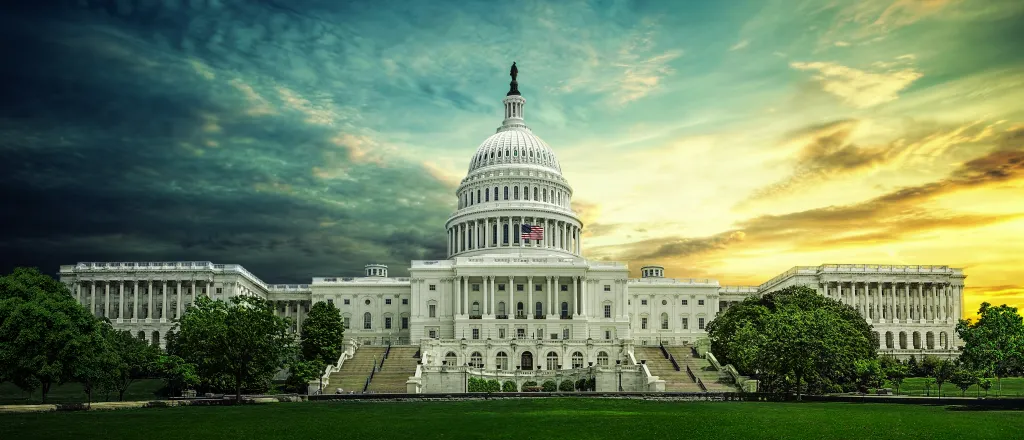
Republicans will control Congress. But a slim House majority may trim their ambitions.
Senate Republicans huddled behind closed doors Tuesday to plot the path forward for the unified control of government they won in the November elections, though GOP senators said afterward a very narrow House majority will likely determine how sweeping their policy proposals will be.
Republicans are planning to use the complicated budget reconciliation process to address immigration and energy in one bill before turning their attention to taxes later next year in a separate bill. The specifics of those measures or how they might affect policy are not yet clear.

© fitimi - iStock-528483210
That budget reconciliation process will allow the GOP to get around the 60-vote legislative filibuster in the Senate that typically forces bipartisanship on big-ticket items. Reconciliation is generally used when one party controls the House, Senate and the White House, since it requires a majority vote in each chamber.
But with House Republicans likely to hold just 220 or 221 seats during the upcoming session of Congress, there will be very little room for GOP lawmakers in that chamber to vote against reconciliation bills, since Democrats are not likely to be included in negotiations or to vote for the final versions.
Colorado was the site of one of a handful of toss-up congressional races last month. Republican U.S. Rep.-elect Gabe Evans defeated the Democratic incumbent, Representative Yadira Caraveo, in the state's 8th Congressional District. Evans' win helped Republicans secure their slim majority in the U.S. House next year.
The last time Republicans held unified control of Congress and the White House in 2017, when they passed their tax package via reconciliation, they held 241 House seats, a significantly wider margin than they’ll have next year.
Thune says options presented
South Dakota Senator John Thune, who will become majority leader in January, said lawmakers are working through “how best to maximize the opportunity we have through reconciliation to achieve a lot of the president’s and our objectives and things that he campaigned on.”
“And, you know, there obviously is the tax piece, but we’ve got until the end of the year to do that,” Thune said, referring to 2025. “So the question is how do we execute on using the opportunity of reconciliation.

“So we presented some different options, all of which our members are considering. And so, you know, we’ll see in the end where it lands but we’ve got to work with the House of Representatives and with obviously incoming President Trump to get the best path forward.”
North Carolina Senator Thom Tillis said Republicans still have a lot of work to do ironing out the details of the two packages, given the narrow margins for passage.
“If you take a look at the priorities of one end of the spectrum for the House caucus and the other end on border, there’s some reconciliation, pun intended, that needs to be done before reconciliation,” Tillis said.
House Republican leaders have struggled at times during this Congress to keep centrist GOP lawmakers and far-right members both supportive of large-scale policy bills. Adding in proposals or amendments from one side meant the GOP often lost votes from the other, forcing leaders to constantly walk a metaphorical tightrope when drafting legislation.
Republicans could have a more narrow House majority during the next Congress, likely causing headaches for leadership as they hold “family discussions” on the reconciliation bills.
Johnson stops by Senate GOP huddle
Senator Shelley Moore Capito, R-W.Va., said House Speaker Mike Johnson, R-La., attended the Senate Republican meeting as the two chambers work to stay on the same page heading into January.

“I think we’re pretty unified on where we want to go. It’s just getting there,” she said. “You know, the devil’s in the details.”
Capito, who will become Republican Policy Committee chair next year, said election results sent a clear message to the GOP about what policy changes Americans expect to see during the next two years.
“What the voters are telling us they want us to do is very clear in some ways,” Capito said. “And we can go through the clearest ones first.”
Maine Senator Susan Collins, who will become the first Republican woman to chair the Senate Appropriations Committee next year, cautioned the reconciliation process requires a lot of coordination and planning.
“Reconciliation is extremely complex, as those of us who have been through it before know,” Collins said. “And I think we’re going to have a very busy beginning of the year, which is why I’d like to see the disaster supplemental pass before we leave here for Christmas.
“And I would also still argue that it would be important to try to finish up the FY 25 appropriations bills. I realize that’s going to have to go into January at this point. But I’m still hoping we don’t go into March, because with reconciliation coming down the pike, the president’s new budget, which is due the first Monday of February, also coming at us, there’s going to be a ton of work to do.”
Delayed spending bills
Congress was supposed to complete work on the dozen annual government funding bills by Oct. 1, but instead relied on a stopgap spending bill to extend the deadline until Dec. 20.

Since they haven’t made any real progress on the full-year bills, congressional leaders are now debating how long a second continuing resolution should last.
That appropriations work will likely pile up at the beginning of next year, overlapping with Republican efforts to push through their first reconciliation package before turning their attention to the second one.
Iowa Senator Chuck Grassley said he’s confident House GOP leaders will be able to whip the votes necessary amid another razor-thin majority to approve the two reconciliation packages next year.
“We need to show that we’re recognizing the mandate of the last election, and have something smaller and hard-hitting before we take on the big issues,” Grassley said.
House Republicans, he said, “know there’s a mandate to deliver on. And they know that they better deliver.”
‘We have a directive from the American people’
Alabama GOP Senator Katie Britt said Johnson will be able to keep the centrist and far-right members of the House Republican Conference united as details emerge in the weeks and months ahead about how exactly the two reconciliation packages will change policies.
“We know we have a slim majority in the House, but Speaker Johnson is aware of that,” Britt said. “And I think that they will work through issues over there, because we know that we have a directive from the American people to actually get things done. And I think that that’s what we’re unified to do.”

© Delpixart - iStock-607610082
Asked about the narrow margins Republicans will have, Wisconsin Senator Ron Johnson said “hopefully, this will all be things that we can form consensus on.”
“It’s what President Trump ran on and we’re going to try and, obviously, pass his agenda,” he said.
Arkansas Senator John Boozman, a Republican, said their timeline is “as soon as possible” but that they’ll have to wait.
“It’s going to be a lot going on, but the budget is number one — we have to do that to start the process, and then just as quickly as possible,” Boozman said.
Congress must adopt a budget resolution in order to unlock the reconciliation process. That tax and spending blueprint is not a bill and does not become law. Instead, it sets Congress’ goals for the 10-year budget window.
In order to actually fund government departments and agencies, Congress must pass the dozen appropriations bills, which they’ve mostly ignored for the last several months.
Ariana Figueroa contributed to this report.
Colorado Newsline is part of States Newsroom, a nonprofit news network supported by grants and a coalition of donors as a 501c(3) public charity. Colorado Newsline maintains editorial independence. Contact Editor Quentin Young for questions: info@coloradonewsline.com. Follow Colorado Newsline on Facebook and X.















